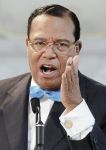by Valencia Mohammed
For New Pittsburgh Courier
More than 17,000 people converged at the Philadelphia Convention Center in Philadelphia Oct. 9 to celebrate the 16th anniversary of the Million Man March. The atmosphere was highly charged with security checkpoints at several stops throughout the 1 million-square-foot facility and escorts to keep order and protect Minister Louis Farrakhan.
 |
|
Minister Louis Farrakhan
|
Thousands of members of the Nation of Islam, mixed with celebrants from all walks of life, crowded the facility to hear Farrakhan’s message. Before Farrakhan spoke, several platform guests reminisced about the historic events of Oct. 16, 1995.
D.C. Council member Marion S. Barry was the mayor of the District of Columbia in 1995. He said at that time he was heavily criticized for supporting the Million Man March because many considered Farrakhan controversial at best and racially divisive at worst. “When the call came to me about the idea, I gave the Million Man March my blessings. I gave it the disposal of all city agencies and my staff to make it happen. I knew it would be successful,” Barry said.
After the event, Barry said, the downtown area was cleaner than it had been before the gathering. “I’ve never seen the city look that good after a big demonstration. The Million Man March set the standards,” Barry said.
Cora Masters Barry was also on hand to tell the crowd about some of the influential women behind the scenes. “First of all, let me tell you that my husband is humble. You have no idea how many threats were made on him and our family during that time if he didn’t stop the Million Man March,” she told the crowd.
“Many of the women who worked tirelessly at the helm to make it happen are dead now. Rosa Parks, Dorothy Height, C. Delores Tucker, Betty Shabazz, Bev Smith and many more dedicated everything they had to make sure it was successful. You have no idea what criticisms they took for participating and organizing the march. But all of us said at that time that if we had the chance to do it all again—we would.”
Other speakers included Pastor Willie Wilson, Malik Zulu Shabazz, Sister Claudette Muhammad, Tynetta Muhammad, widow of the Honorable Elijah Muhammad and Khadijah Muhammad, Minister Farrakhan’s wife.
Farrakhan described accomplishments achieved since the march, the state of the Black community and what the future may hold. “We ain’t marching no more. The time for marching is over,” Farrakhan said. “The future of our people depends on our ability to mobilize against what is happening as a result economic downfall and continuous racism.”
He said more fathers stepped up to take care of their children and that it is not uncommon to see Black men with their children. Crime went down for a number of years but in these tough economic times, some are resorting to old bad habits.
“Believe it or not, we are at war in America! Our survival as a people is at stake. The weak, cowardly elected officials we have should step down. This is a time for real men and women to represent us who understand that in order for our people to be free sacrifices must be made,” Farrakhan said.
“The time for talk is over. Stop blaming other people. We must do for ourselves. Stop being dependent on the government to take care of you or you will die when the dollar dies.”
The crowd stood on its feet and applauded Farrakhan several times throughout the two-hour long speech. “My dear President Obama, I love you. But instead of you fighting like hell for Black people it seems you are more worried about how to be accepted by Whites. And Black people must realize that our condition under Barack Obama will not change if he is reelected for another four years because we have not given him a mandate for our support. And your own party is trying to dump you.
“We must change our current leadership. We must elect leaders who will fight, fight and fight for our people.”
Echoing recent remarks before the Congressional Black Caucus’ Annual Legislative Conference by Robert Johnson, former CEO of Black Entertainment Television, Farrakhan said, “We must not expect White people to take care of us. We must do for ourselves by owning and supporting our own businesses and products, schools, housing, banks, etc.”
(Reprinted from The Afro American.)